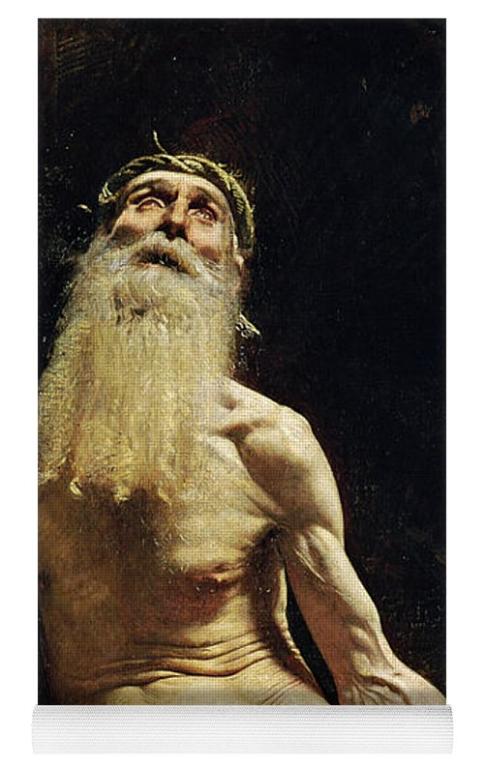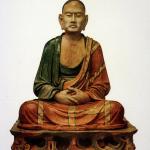God as a Zen Koan or Huatou
When I am silent, I fall into the place where everything is music.
Rumi
I notice that today, May 10th, is one of the days that Job of the Book of Job is celebrated. Job is one of my favorite figures in the Bible. And, thinking about him, I found a stream of mind bubbles playing out…
Job and God.
And from there about God.
When I read Stephen Batchelor’s controversial and wonderful After Buddhism, I was particularly struck by a passage he cited. It’s from the Nikayas, the Theravada community’s collection of the putative sayings and doings of Gautama Siddhartha. This quote actually appears twice, in both the Udana and the Itivuttaka texts of the Kuddaka Nikaya, (here in Maurice Walshe’s translation, very lightly adapted
“There is, monks, an unborn, unbecome, unmade, uncompounded. If there were not this unborn… then there would be no deliverance here visible form what is born, become, made, compounded. But sincere there is an unborn, unbecome, unade, uncompounded, therefore a deliverance is visible for what is born, become, made compounded.”
Here we get the closest Buddhist scriptures ever come to describing what in Hinduism is called Atman and in the West might be called God. For the West this passage from the Pali scriptures is perhaps not all that close.
Except maybe among some of the mystics. God the unborn.
Personally I find the mystery that is packed into our English word God is wonderful. Messy. Complex. Inviting. I once understood etymologically God was be related to the word “good.” Apparently this is not so. Rather it seems to drive from the proto-Germanic Guthan. Which then disappears into “uncertain origin.” Another kind of unborn. One more facet to the jewel of that is unbecome, unmade. Guthan might have something to do in the way back with an offering. Of course, now, both good and offering are joined into the word along with a host of lovely and awful things. Uncompounded in the strange way everything is presented in each thing.
It is so much that at last I find God almost as meaningless. But meaningless in about as evocative a way as the koan word, sound, Mu. Mu is usually understood to mean “no” or “not.” But the negativity of the word then empties and empties itself. And with that it can be found in everything, anything, all things, and none. God is kind of like that. For me.
And with that, like Mu, God is a koan. As my grand teacher Robert Aitken said of koans, it is something to be made clear. Not a problem to be solved, but something to be known. Or, maybe better, casting us into not knowing.
In Japanese Zen koan has become part of a curriculum. One works with a case and in time one moves on to another. However, koan work is itself rooted in a more ancient project called huatou in Chinese or wato in Japanese. It roughly translates as “word head,” and means the point.
Many koans can be taken on as huatou and while one is constantly finding nuances and surprises, one never leaves it during a life time. Or rarely.
Me, I find putting this and say the vision of God we find at the end of the book of Job together:
“Then the Divine answered Job out of the whirlwind, and said, who is this who despairs without knowledge? Pull yourself together. I have questions for you, and you must answer. Where were you when I laid the foundations of the earth? Tell me, if you understand. Who measured out the universe; do you understand? Who gave it shape; do you understand? Who set the foundation, who set down the cornerstone? When the morning stars sang together, and all the children of God shouted for joy, where were you?”
That.
God. The koan. God, the huatou.
God an invitation. An encounter.
For people who find resonance with the world-is-divine the idea of something extra like God as a person talking to Job makes little sense. For those who find resonance with the divine as some human-like power creating and directing the course of existence the world as divine is reductive, vastly too insufficient.
I’m moved by the encounter in Job. And, I find that bare thing described in the Pali canon touches something deep within me. Hinting. Mysterious. And, still, not quite right. Not quite my own experience. I often rail that this isn’t about reification, adding capital letters to those words unborn, unbecome, etc – as, is, in fact, done in Maurice Walshe’s original translation. (Hence my light editing) It’s vastly more subtle.
And. But. However. I find this encounter is so amazing that even while it is rife with many dangers, using the overblown language of religion, using even the word God, maybe even using those capital letters when trying to describe that place, that encounter, that moment when self and other fall away feels to me pretty right.
One more quote, this from the Catholic friar Richard Rohr,
“We worshiped Jesus instead of following him on his same path. We made Jesus into a mere religion instead of a journey toward union with God and everything else. This shift made us into a religion of ‘belonging and believing” instead of a religion of transformation.”
We are being invited into new worlds. What Jesus called the Kingdom of God. His framing of the koan.
Buddhists are much better about the details of the path, I find. Often. Not always, but often. I find. Koan work for instance. Understanding the invitation of a sacred word or point. Say. Like. God. This invites the question of clarification. What precisely is the encounter, and what is that transformation?
For me, once I sorted that I don’t feel much resonance with the Abrahamic God as is generally presented. Creator and destroyer. Instigator and judge. Although, again, each of these things linger. Each opens doors into truths.
But there is a continuing invitation, that process of clarification. So it can rest nowhere.
One of my burning questions. Is there something common that informs the different religions? To anyone who has seriously studied them, the idea that all religions are different paths leading to the same summit makes little sense. Sure looks like a lot of different mountains. And. And, there seems somewhere down deep connections, similarities within the vast differences.
God.
And for me these words from the Sutta are all pointing to some deep human intuition, longing, and experience imperfectly presented in all religions. Even Buddhism. Even Christianity.
Even God.
And, yes, I catch the dangers of my making that assertion. I am either past presumptuous or certainly tottering at the edge of hubris. But. But this is confession as much as assertion. And that text from the Pali is for me a little closer to the real mystery at the heart of our stories about that great encounter, which describing never seems quite to meet the experience, but which rests in my heart and pulls me and pushes me.
Which brings me to one of the most important texts I have out of the Christian scriptures. 1 Corinthians 13:12
“For now we see through a glass, darkly; but then face to face: now I know in part; but then shall I know even as also I am known.”
I find this passage can be unpacked endlessly. And, of course, time and space have a thing going. It’s always through a glass, darkly. And, it is always knowing and known. This project is not completely a private thing. It is our project, yours and mine. But it also involves a surrender, a letting go, a falling into some mysterious thing. That not knowing. The word dance often works for me. If we’re not too literal. Because we become dance and dancers, all of them.
Koan. Huatou.
Words are not it. And, as another teacher told me, even words are it. So, knowing the problems, always falling short, I keep trying to put words to it. Or, find them.
With that a last quote.
For me Ranier Maria Rilke describes what I’m trying to approach in ways that are wildly resonant for my experience in his “Widening Circles.”
I live my life in widening circles
that reach out across the world.
I may not complete this last one
but I give myself to it.
I circle around God, around the primordial tower.
I’ve been circling for thousands of years
and I still don’t know: am I a falcon,
a storm, or a great song?
Not knowing. Ah, the true song of God. Only don’t know.
And then?
Falcon?
Storm?
Creator and judge?
Ground of being?
Kingdom of Heaven?
A verse from some great song?
A koan…














